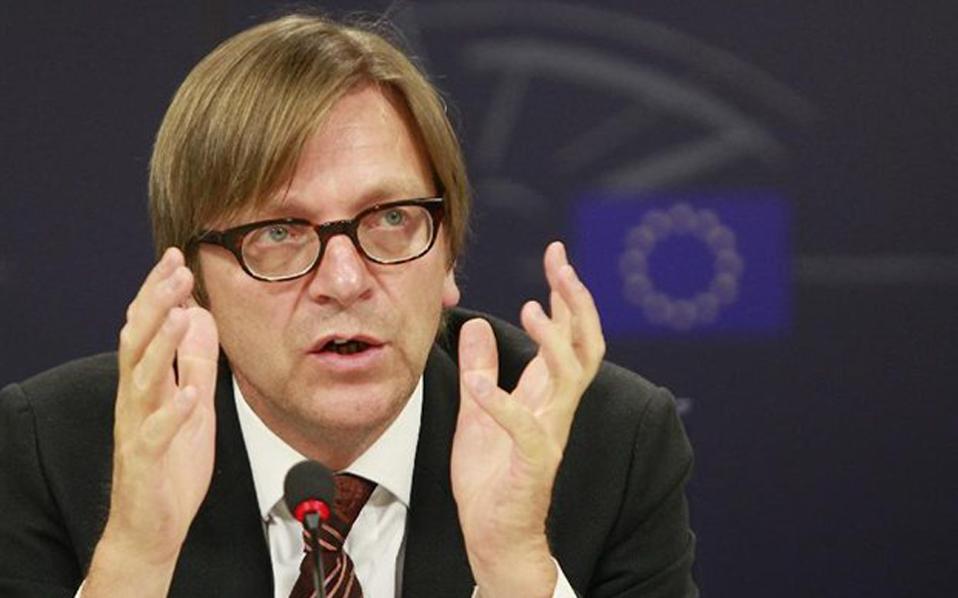Highlights from Wednesday’s debate on Greece in European Parliament

Following are comments from lawmakers at European Parliament on Greece a day after euro zone members gave the country until the end of the week to offer new proposals in return for loans to keep it from crashing out of the single currency bloc.
Ryszard Legutko, MEP from Conservative Group ECR
Something is rotten in the state of Greece, but something is rotten in the EU too. In the beginning there was the original sin of the currency union and today we are reaping its fruits.
I have an impression of a piece de theatre that has been unfolding before our eyes. Nothing really is what it seems. The Greeks want help and at the same time they want to have a free hand apparently not knowing the old saying that "he who pays the piper gets to call the tune". They organise a referendum which was and at the same time was not about what it was reported to be about.
In Greece-EU relations we have witnessed a number of final rounds of talks and we know that the word 'final' does not mean final. It means something else. We heard the currency unionists speak about Greece but what they have in mind is the monetary union and they want to help the monetary union and seeing it as the crucial debate. They say that once Greece is out the entire construction, said to be so magnificently stable and firm, will fall into pieces. Either one or the other.
So if this piece de theatre continues I think we will be more and more confused about who and what we are trying to save. Are we trying to save the currency union, Greek society, the credibility of the government, the creditors, the reputation of Angela Merkel, or the infallibility of ever closer-union? We certainly cannot save all of these. There will be some casualties.
Dimitris Papadimoulis, SYRIZA MEP
A united Europe without Greece is like a child without a birth certificate. The Greek people don't want a Grexit, 80 percent don't want it. It would produce a huge cost in economic, social and geopolitical terms.
All of us, urgently, by Sunday, have to do what needs to be done, whatever it takes, as Mr. Draghi says, so we see the word Grexit wiped out of EU vocabulary for ever.
Marine Le Pen, Leader of France's National Front
Greece must negotiate its way out of this steel clamp.
Nigel Farage, Leader of UK Independence Party UKIP
There is an irreconcilable cultural difference between Greece and Germany, between the North and the South. The European project is beginning to die. There's a new Berlin Wall and it's call the euro.
It would be madness, sir, to continue on this course. Greece was very brave.
They will give you no more, these people (euro authorities). Frankly, if you've got the courage, you should lead the Greek people out of the euro zone with your head held high.
Guy Verhofstadt, Head of the Liberal Group ALDE
The choice you have is very simple. How do you want to be remembered? As an electoral accident who made his people poorer in his country? Or do you want to be remembered Mr. Tsipras as a real revolutionary reformer in the tradition of Trikoupis and Venizelos? That is the choice to make. And I know what your people want, 80 percent of your people want to stay in Europe and in the euro zone. So show what you can do and show you're a real leader and not a false prophet.
Alexis Tsipras, Greek Prime Minister
I find myself here only a few days after the resounding verdict of the Greek people, after a decision we took to give the floor directly, to ask the Greek people directly, for the their views and be an active part of the negotiations affecting their own future. A few days after these negotiations we've now been given a mandate to redouble our efforts to get a socially just and economically sustainable solution to the Greek problem, without repeating the mistakes of the past which condemn the Greek economy to a period of never-ending impasse of austerity which trapped our economy in a recessionary vicious circle.
Let me assure the house that, quite apart from the crisis, we will continue with our reform undertakings. Let's not forget that for the past five years the Greek people have made a tremendous effort for adjustment but this has exhausted the resilience and the patience of the Greek people.
We demand an agreement with our neighbors but one which gives us a sign that we are on a long-lasting basis exiting from the crisis, which will demonstrate that there's light at the end of the tunnel.
The proposals we have made to our partners are credible reforms with an acceptable degree of burden sharing without recessionary effects. We need to ensure the medium term funding of our country with a development and growth program because otherwise we won't exit from this crisis. Our prime objective must be to combat unemployment and to encourage entrepreneurship.
I am not one of those politicians who claim that those responsible for the woes of Greece have been wicked foreigners. Greece has got to the verge of bankruptcy because for many many years, the governments of
Greece have been creating a clientelist governments, they have strengthened the hands of corruption, they have created and nurtured a nexus between political and economic power.
They have allowed tax evasion to run riot and it's not right. In accordance with a survey by Credit Suisse, 10 percent of Greeks currently have 56 percent of the national wealth and 10 percent in a time of austerity, they have not shared the pressure.
This is a major injustice and the programs, the bailout programs have not made things better. They were supposed to bring about reforms but those reforms have not made things better, on the contrary they have made things worse. We were supposed to bring about reforms but those reforms have not, and too, the tax collection mechanisms which collapsed under the excessive zeal of enlightened terrified national officials.
None of the reforms have helped when it comes to the nexus between the political establishments, the oligarchs and the banks in that three-sided ring. None of the reforms have improved the functioning, the efficiency of the mechanisms of the state which have now become inured to working in the selfish interests, the vested interests rather than the common good.
European history is a history of conflict but conflict leading to compromise, it's also a history of convergence and enlargements, it is a history of unity and not divisions, and this is why we talk about a united Europe and let us not allow it to become a divided Europe.
At this time, we are called upon to produce a productive and fair compromise which will avoid a break-off in negotiations and this is in line with the traditions of European Union.
All of us have taken the measure of the situation and I believe that together we can rise to this historical challenge.
Donald Tusk, President of the European Council
Our inability to find an agreement may lead to the bankruptcy of Greece and the insolvency of its banking system. And for sure it will be most painful for the Greek people. I have no doubt that this will affect Europe, also in the geopolitical sense, if someone has any illusion that it will not, they are naive.
The stark reality is that we have only four days left to find an ultimate agreement. Until now I've avoided talking about deadlines but I have to say it loud and clear that the final deadline ends this week. All of us are responsible for the crisis and all of us have the responsibility to resolve it. As Plutarch once said: To find fault is easy, to do better is difficult. I hope doing better is not as difficult as Plutarch once thought. Let us prove him wrong.
[Reuters]





